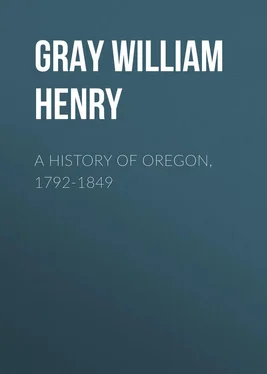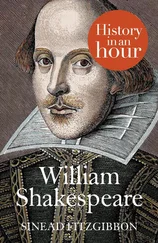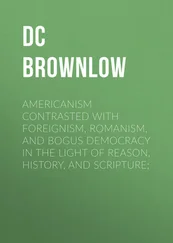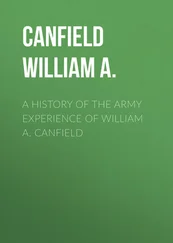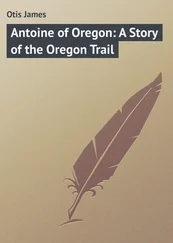William Gray - A History of Oregon, 1792-1849
Здесь есть возможность читать онлайн «William Gray - A History of Oregon, 1792-1849» — ознакомительный отрывок электронной книги совершенно бесплатно, а после прочтения отрывка купить полную версию. В некоторых случаях можно слушать аудио, скачать через торрент в формате fb2 и присутствует краткое содержание. Жанр: literature_19, foreign_antique, foreign_prose, Историческая проза, на английском языке. Описание произведения, (предисловие) а так же отзывы посетителей доступны на портале библиотеки ЛибКат.
- Название:A History of Oregon, 1792-1849
- Автор:
- Жанр:
- Год:неизвестен
- ISBN:нет данных
- Рейтинг книги:5 / 5. Голосов: 1
-
Избранное:Добавить в избранное
- Отзывы:
-
Ваша оценка:
- 100
- 1
- 2
- 3
- 4
- 5
A History of Oregon, 1792-1849: краткое содержание, описание и аннотация
Предлагаем к чтению аннотацию, описание, краткое содержание или предисловие (зависит от того, что написал сам автор книги «A History of Oregon, 1792-1849»). Если вы не нашли необходимую информацию о книге — напишите в комментариях, мы постараемся отыскать её.
A History of Oregon, 1792-1849 — читать онлайн ознакомительный отрывок
Ниже представлен текст книги, разбитый по страницам. Система сохранения места последней прочитанной страницы, позволяет с удобством читать онлайн бесплатно книгу «A History of Oregon, 1792-1849», без необходимости каждый раз заново искать на чём Вы остановились. Поставьте закладку, и сможете в любой момент перейти на страницу, на которой закончили чтение.
Интервал:
Закладка:
Peter was informed by Antoine that Mr. John, on leaving the room where the men were drinking, went up-stairs to his own apartment, and he heard him say to his wife, “I am going to die to-night.” And he and his wife both began to cry. Mr. John soon rallied, and observed, “Very well; if I die, I must fall like a man.” He then told Antoine to load his rifles and pistols, and ordered him also to arm himself with his own gun. He and Antoine then went out, and Peter thinks he heard the report of more than fifteen shots. Antoine afterward told Peter that Mr. John fired at Laperti, but missed him, and afterward ordered Antoine to fire at Laperti. Antoine refused to do so, until his own life was threatened by Mr. John, when he fired in the direction, without aiming at Laperti. He also told the Kanakas to kill the Canadians, and it was in part they who fired the shots that he (Peter) had heard. Peter then got up and placed himself behind his door, and saw Mr. John come in and go up-stairs with Antoine, when he took the opportunity of going out, armed with his gun and a stout bludgeon, and found the men standing here and there on the gallery watching an opportunity to shoot Mr. John. Laperti’s position on the gallery was fronting the door of the main house, toward which he had his gun pointed; when Peter saw him, he was on his knees, the small end of the gun resting on the top rail of the gallery, in readiness to fire. Laperti exclaimed, on seeing Peter, “I must kill him now, as he has fired two shots at me.” Peter objected to this, and proposed to take and tie him. Nobody answered him. At that moment, Smith came up to Laperti and told him to hide himself or he would certainly be killed. Laperti said, “Where can I hide myself?” and Smith said, “Come with me and I will show you a place in the bastion where you can hide yourself,” and they went off together in the direction of the bastion at the corner of Urbaine’s house. Peter, after a few minutes’ stay on the gallery, returned to his house, as he had previously agreed upon with George Hebram, who was lying sick in bed, and who had entreated him not to leave him alone. At the door of the main house, he met Mr. John coming out, followed by Antoine, who was carrying a lamp. Mr. John said to Peter, “Have you seen Laperti?” Peter answered, “No, I have not seen him;” and then Mr. John said, “Have you seen Urbaine?” And Peter again answered that he had not. The minute before this, as he (Peter) was returning from the gallery, he had seen Urbaine standing at the corner of the main house, next to Urbaine’s own dwelling, in company with Simon. Urbaine said, “I don’t know what to do; I have no gun, and do not know where to hide myself.” Simon said, “I have a gun, if he comes I will shoot him, and will be safe.” Mr. John, after Peter passed him, said to Antoine, “Make haste, and come with the lamp,” and proceeded with a firm step to Urbaine’s house, as Peter, who continued watching at the door, saw.
After he saw them go to Urbaine’s house, he proceeded toward his own room, and he and Antoine called out, “Fire! fire!” The report of several shots, probably five, immediately followed, and he heard Antoine exclaiming, “Stop! stop! stop! He is dead now.” Antoine afterward related to Peter, that on reaching Urbaine’s house, Mr. John ordered him to go round by one corner, while he went round by the other, directing Antoine to shoot any of the Canadians he might meet. Mr. John then proceeded in a stooping position, looking very intently before him, when a shot was fired from the corner of the house toward which he was going, which caused his death, the ball having entered at the upper part of the breast-bone, a little below the gullet, and come out a little below the shoulder, having broken the spine in its passage. Peter was also told by one of the Kanakas, that as soon as Mr. John fell, Urbaine sprung forward from the corner of the house within a few paces of the body, and put his foot savagely on his neck, as if to complete the act, should the ball have failed in causing death. The Kanakas immediately asked Urbaine who had killed the master. Urbaine replied, “It is none of your business who has killed him!” Peter, who during this time had removed to his house, seeing Heron go out without his gun, went out round the body, and said, “My friend, we have now done what we long intended to do; let us now carry the body back to the house.” Urbaine, Laperti, Bellinger, and other white men who were present replied, “When we kill a dog, we let him lie where we kill him.” And Antoine told him they had previously given him the same reply to a similar proposition from him. Peter then approached the body, and, with one hand under the neck, raised the head and trunk, when a deep expiration followed, which was the last sign of animation. He had previously perceived no signs of life, nor did he hear any one say that any appeared after the deceased fell. The white men being unwilling to assist him, he carried the body, with the aid of the Kanakas, into the main house, where he had it stripped, washed clean, decently dressed, and laid out. In doing so he received no help from any but the Kanakas. The wounds made by the balls were very large, both openings being circular, and severally three inches in diameter. The body bled profusely, there being a deep pool of blood found around it, which was washed away afterward by the Kanakas. Peter never heard that he spoke or moved after he fell. There was a perpendicular cut on the forehead, skin-deep, in a line with the nose, which Peter thinks was caused by his falling on the barrel of his rifle, though Urbaine said that he had received it from an Indian with his dog. It was, as Peter supposes, about eleven o’clock, P. M., when he had done washing and laying out the body; the watches had not then been changed, therefore he thinks it could not be midnight. The people continued coming and going during the night, to see the body, and Peter proposed praying over the body, as is customary in Canada; but they objected, saying they did not wish to pray for him. He did sit up with the body all night, having soon after gone, first to Urbaine’s and then to Lulaire’s house, who each gave him a dram, which he took, saying, “There is no need of drinking now; they might drink their fill now.” He soon afterward went to bed.
He inquired of Martineau, who also lived in the same room, if he had fired at the deceased. He replied, that he had fired twice. He then asked him if it was he that had killed him, and he said, “I do not know if it was me or not.” He (Peter) put the same question to several of the other men whom he saw afterward; they all said that they had not shot him, and Martineau afterward said that he had not directed his gun at him, but had fired in the air.
The following morning he asked Antoine Kawanope if he knew who had killed the deceased. He replied, “I know who killed him, but I am not going to tell you, or any one else. When the governor comes, I will tell him.” He asked Antoine why he would not tell; he said he was afraid it might cause more quarrels, and lead to other murders. He then advised Antoine not to conceal it from him, as he would tell no one. Antoine then said, he thought it was Urbaine who had done the deed. Peter observed that Urbaine had no gun. Antoine replied, “I think it was Urbaine, because as soon as the deceased fell, Urbaine rushed out from his lurking-place at the corner of the house, where, I was informed by the people, he always kept his gun secreted, with the intention of shooting the deceased.” Peter says Laperti, Urbaine, and Simon were all concealed in the corner whence the shot came, and he thinks it to be one of the three who fired it. Urbaine always denied having committed the murder, and said, “I am going to the Russian fort for trial, and will be either banished or hung. I will let the thing go to the end, and will then inform upon the murderers.”
Читать дальшеИнтервал:
Закладка:
Похожие книги на «A History of Oregon, 1792-1849»
Представляем Вашему вниманию похожие книги на «A History of Oregon, 1792-1849» списком для выбора. Мы отобрали схожую по названию и смыслу литературу в надежде предоставить читателям больше вариантов отыскать новые, интересные, ещё непрочитанные произведения.
Обсуждение, отзывы о книге «A History of Oregon, 1792-1849» и просто собственные мнения читателей. Оставьте ваши комментарии, напишите, что Вы думаете о произведении, его смысле или главных героях. Укажите что конкретно понравилось, а что нет, и почему Вы так считаете.
